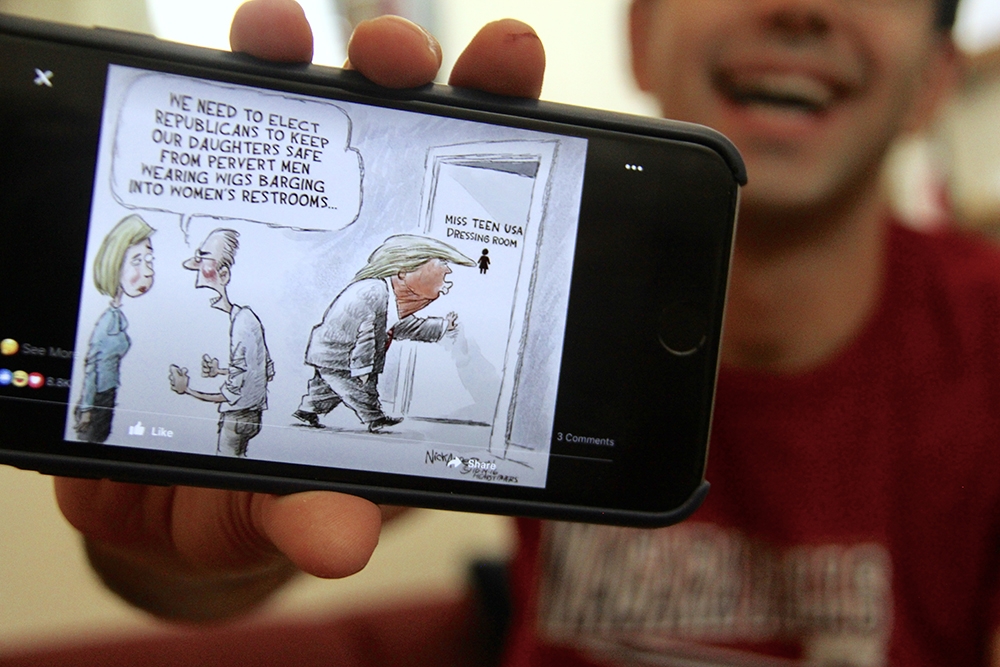Jodie Vanderslot | Staff Writer
Featured image: Recent American presidential debates spark a number of Twitter trends and memes circulating millennials feeds. | Amir Yazdanparast
Social media platforms like Twitter, Facebook and Instagram are some of the biggest influencers in today’s society. With the world becoming much more connected, social media seems to be the glue that holds us together, keeping us connected and aware.
Perhaps this is most clearly seen in the political realm. Twitter updates, Instagram posts and Facebook statuses are allowing us to share our thoughts and opinions. One of the best examples of this is the American presidential campaign. Through the generation of memes and witty tweets from users regarding highly political topics, it appears that there are a lot more people involved in politics online. But does this translate into actual action from posts to polls?
Social media has changed the way politics operates, allowing voters to listen to messages from potential leaders and also engage and interact with their content on a wider scale. Platforms like Facebook and Twitter allow voters to turn into what would otherwise be seen as political jargon into comedic, digestible relief. These platforms play a crucial and significant role in reaching young voters and capturing the millennial generation’s vote.
“When we look at the social media areas frequented by youth, we see it is the same where the meme culture is rooted,” says Andrew Ashley, a second-year political science student and City of Toronto Youth Councillor candidate for Ward 2.
“I remember when I missed the first [American] presidential debate, I saw a meme on Instagram of Hillary and I was immediately excited to watch the debate. So meme culture is a good way of getting youth to watch the political developments,” he adds.
Social media serves the voters as a way of expressing their interests in issues they care about, and in particular, how they’re being handled and how they will be addressed in the future. In recent political debates, voters have used Twitter, Instagram and Facebook to send in questions for candidates. In this bottom-up level of participation, voters’ issues are actually brought to the attention of candidates and addressed in unprecedented ways.
Dennis Pilon, professor in the Department of Political Science, explains that social media is a tool: “It doesn’t do anything on its own, it depends on what people do with it.”
Facebook and Twitter provide vast amounts of political information and reveal many opinions, conveyed in sometimes mocking or comical ways. It is tools such as these that have transformed 20th century politics.
“Relating the political world into meme language and culture does influence voter turnout. We live in a technological and social media world, where the meme culture [hits] home,” explains Ashley.
While social media, and meme culture specifically, plays a vital role in fostering youth engagement with politics, Pilon states that in comparison to traditional forms of voter contact, such as personal contact, social media takes a backseat and should be used as a follow up. In order to foster youth involvement and actual concern in politics, the implementation of political courses must be further integrated into the education system.
Ashley credits Prime Minister Justin Trudeau for recognizing the need for political awareness in youth, creating the Prime Minister’s Youth Council, which will act as a way to integrate youth into politics.
“When youths are more exposed to the political language, there is a higher chance of them becoming more interested in politics. Furthermore, they would be able to understand the terminologies being used on the news. Having these courses also makes youth more aware and [understand] the vitality of getting involved in politics,” says Ashley.
Instead of relying solely on social media as a source of information, we must see it as an asset, not the whole picture. As younger generations take to the polls to cast their votes, we must recognize that the influence of social media is widespread and while it serves as a great source of access to resources, political agendas and current issues, it should remain a secondary source.





These topics are so conufsing but this helped me get the job done.